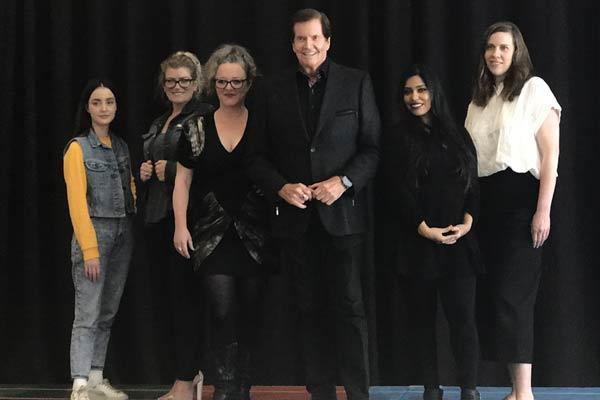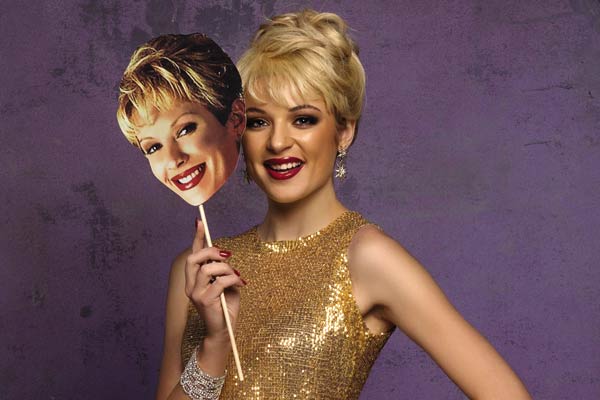In the '80s and '90s, an era in women’s rights wedged between 'Mad Men' and #metoo, game show hostess Adriana Xenides bravely tried to spin public perceptions about gender roles and mental and physical health on their head.
Clare Watson, Artistic Director of Black Swan Theatre Company wants to reframe perceptions about Adriana’s unfortunate life with her new musical, 'Xenides'.
Clare Watson often ponders the influence that messages directed towards her through the media as a child have had in shaping her world view. The Black Swan Theatre Artistic Director’s pursuit of a career in the arts, for example, can be traced back to the moment that she saw 'The Sound Of Music' for the first time.
Julie Andrews wasn’t the only blonde starlet on Clare’s childhood screens, though. She vividly recalls watching Adriana Xenides spin the letters on the game show, 'Wheel Of Fortune'. Black Swan’s new stage musical about the hostess’s life, 'Xenides', is a fusion of those two early influences.
TV game shows were meant to be light evening family entertainment for Clare, but in retrospect, 'Wheel Of Fortune' had a dark underbelly, she says.
“There’s one clip of [host] Ernie Sigley online where he tells her that she has fat ankles and she just sort of stands there and laughs and you think “'wow, you’ve literally held your head up strong in battle night after night'.”
“The thing that I find really fascinating is, because I grew up watching these shows, is that I sat on the couch as a little girl watching people laugh at these horrible things that were being said to women. How have we as an audience internalised those things and what can we do to undo that?”
'Xenides', then, is at least a first step, Clare says, in redressing the past but the work also aims to change the present and future by showing that the experiences of Adriana were not unique; they were and still are perhaps the norm in the entertainment industry.
“We’ve really delved into the politics of #metoo. We see women who are on stage who talk about their own experiences, so casting experiences or roles that they’d been cast in and casting couch conversations that they’d had. They play themselves, and they play Adriana in the story. Form-wise this will be nothing like you’ve seen before.”
Clare says that the inspiration for the show, though, came long before the Harvey Weinstein scandal instigated a social media furore. It was the media coverage that followed Adriana’s premature death, aged 54, in 2010, that first lit the fire, she says.
“When she died, and she died too young, the stock footage that they chose to use to accompany the news was her spinning the letters to “mutton dressed as lamb” and that was actually the moment that instigated this work because I was furious on her behalf and felt that how could a woman who had given her life to television, her life to an audience and a life to a TV station, how could she be mocked so unglamorously and disrespected at the moment of her death and how do we as an audience absorb that information and particularly how do we as women absorb that information?”
There was no respite in death for Adriana from the jibes and taunts that plagued her life. Some obituaries were particularly vicious, advancing the idea that she was simply a man-hungry, image obsessed ladder climber. Clare explains her attitudes towards such media narratives.

L-R: Adriane Daff, Harriet O’Shannessy, Director Clare Watson, John Burgess, Laila Bano Rind and Katherine Tonkin - Image © Irene Jarzabek
“[Columnist and author] Clem Ford in [her book] ‘Fight Like A Girl’ talks quite a lot about online trolling and how there is this desire to create a victim out of some women. Certainly with Adriana, [the media] have played into that trope of the tragic blonde, which we’ve seen with Princess Diana and Marilyn Monroe and it’s a trope that the media likes to roll out again and again.”
“One of the things that we are trying to do with this show is to try to understand this character. We might have swallowed the pill and bought the idea that Adriana is this tragic blonde and we might have bought the idea that she is manipulative but actually what we have here is a much more complex character. We can look through the prism, we can turn the kaleidoscope and see her in so many different lights, if we choose to, if we choose to be generous.”
There was more to Adriana’s struggle than just gender discrimination. As a migrant from Argentina battling chronic physical and mental health complaints, she fought prejudice in many forms. For Clare, there are many themes to juggle, she says.
“There’s also a bit of a rags to riches story. There’s a lot in her story that I think is quite operatic in scale. Her story plays out as kind of an extraordinary tragedy so it’s how you then let that tragedy sit on the stage and tell that story we know but also fill it out with a lot more complexity.”
While thematically operatic, this is the cabaret-style musical, which is a blend of jukebox classics and original compositions by Xani Kolac. It is a work that delicately balances the glitz and glamour of Adriana’s life, with social commentary.
“It’s a really fun and accessible world but at the same time dealing with these very important themes.
“We’ve definitely got some pretty snazzy costumes and we have a band on stage as well and they’re dressed in some pretty snazzy outfits [but] part of the work as well is trying to show the real woman and strip things back.
“This feels like a bit of a protest piece for Adriana and who she was on screen and off screen and to try and reframe her story a little bit.”
It is just a shame that Adriana didn’t live long enough to see the wheel of history begin to turn.
Black Swan’s 'Xenides' plays Studio Underground at State Theatre Centre from 25 October-11 November.

